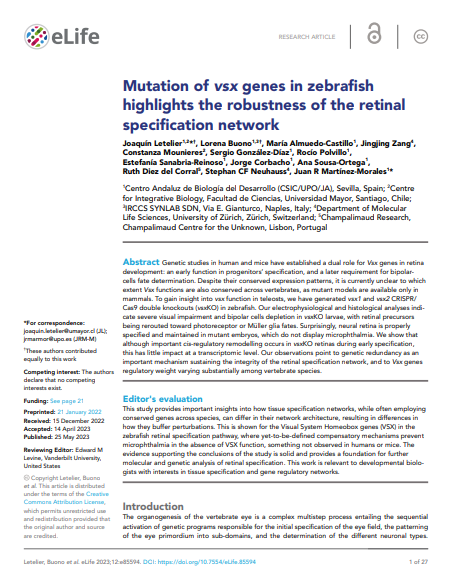Mutation of vsx genes in zebrafish highlights the robustness of the retinal specification network

Fecha
2023-05-25Autor
Letelier, Joaquín [Univ Mayor, Fac Ciencias, Ctr Integrat Biol, Chile]
Buono, Lorena
Almuedo-Castillo, María
Zang, Jingjing
Mounieres, Constanza [Univ Mayor, Fac Ciencias, Ctr Integrat Biol, Chile]
González-Diaz, Sergio
Polvillo, Rocío
Sanabria-Reinoso, Estefanía
Corbacho, Jorge
Sousa-Ortega, Ana
del Corral, Ruth Diez
Neuhauss, Stephan C. F.
Martínez-Morales, Juan R.
Ubicación geográfica
Notas
HERRAMIENTAS
Acceda a títulos restringidos
¿Cómo descargar?Resumen
early function in progenitors' specification, and a later requirement for bipolar-cells fate determination. Despite their conserved expression patterns, it is currently unclear to which extent Vsx functions are also conserved across vertebrates, as mutant models are available only in mammals. To gain insight into vsx function in teleosts, we have generated vsx1 and vsx2 CRISPR/Cas9 double knockouts (vsxKO) in zebrafish. Our electrophysiological and histological analyses indicate severe visual impairment and bipolar cells depletion in vsxKO larvae, with retinal precursors being rerouted toward photoreceptor or Muller glia fates. Surprisingly, neural retina is properly specified and maintained in mutant embryos, which do not display microphthalmia. We show that although important cis-regulatory remodelling occurs in vsxKO retinas during early specification, this has little impact at a transcriptomic level. Our observations point to genetic redundancy as an important mechanism sustaining the integrity of the retinal specification network, and to Vsx genes regulatory weight varying substantially among vertebrate species.
URI
https://repositorio.umayor.cl/xmlui/handle/sibum/9431https://elifesciences.org/articles/85594
https://www.biorxiv.org/content/biorxiv/early/2022/01/21/2022.01.20.477122.full.pdf
https://doi.org/10.1101/2022.01.20.477122
https://www.biorxiv.org/content/10.1101/2022.01.20.477122v1
https://www.ncbi.nlm.nih.gov/pmc/articles/PMC10212559/pdf/elife-85594.pdf
Coleccion/es a la/s que pertenece:
Si usted es autor(a) de este documento y NO desea que su publicación tenga acceso público en este repositorio, por favor complete el formulario aquí.